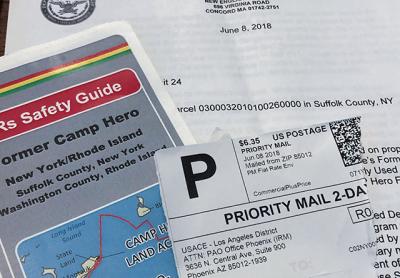Got a Grenade in the Ground? Bombs? Rockets?

Residents of the Montauk Shores condominium complex were unnerved earlier this month to receive a letter from the United States Army Corps of Engineers informing them that “available information indicates military munitions may be present on or near your property.”
Enclosed with the letter, which was signed by a Col. William M. Conde, was a pamphlet stating that bombs, rockets, small-arms ammunition, and practice grenades “were potentially used at the former Camp Hero,” which is about three miles from the condo complex. Camp Hero was a military installation near Montauk Point that first served as a coastal defense post during World War II and was used by the Navy, the Army, and the Air Force to train antiaircraft units.
The pamphlet included a map delineating, in bright red, the areas, both on land and at sea, that may have been on the receiving end of launched explosives.
“I thought one of these bombs went off somewhere in the country and that’s why they sent us this letter,” said Grace Bottari, who has lived at Montauk Shores for 32 years (but never come across any munitions).
In fact, the letter and the pamphlet were sent as a precautionary measure and as part of the Department of Defense’s routine oversight of formerly used defense sites, said Gregory J. Goepfert, a project manager for the Corps of Engineers. He explained that a full investigation of Camp Hero, which was decommissioned in 1982 and has been searched previously for ordnance that may have been left behind, remains open, with more field work to be done.
The intent of the letter, he said, was to “make people aware that we have not completed this process,” and therefore it was possible that a long-buried munition might yet surface. The evaluation of the site is in its middle-to-end stages, he said, and until a “decision document” is issued stating whether or not explosives might still be unearthed on the camp site or in nearby ocean waters, letters will continue to be sent periodically to neighbors and other concerned parties.
A key reason the pamphlet was included with the letter, said Mr. Goepfert, was to spread the word about the three “R’s” of safety that should be observed if one happens upon a munition: Recognizing it as a potential explosive, retreating from it, and reporting it to the police.
Although the Montauk Shores complex is miles away, Mr. Goepfert said that its residents had been contacted in order to guard against “the worst-case scenario,” namely that a munition had been projected onto its grounds.
When Josephine Albano, another longtime Montauk Shores resident, read the letter, she was unfazed by the possibility that a rocket might be hidden somewhere on her property, but she was shellshocked by the amount of money — $6.35 per letter — the government had spent to send the notice, which came by priority mail.
“What a huge waste of money,” she said. “They could have just put it on a TV news show or put an ad in the newspaper.”
When asked why the Army Corps had used such an expensive mode of delivery for the letter, Mr. Goepfert responded, “People’s safety is always considered a priority.”
